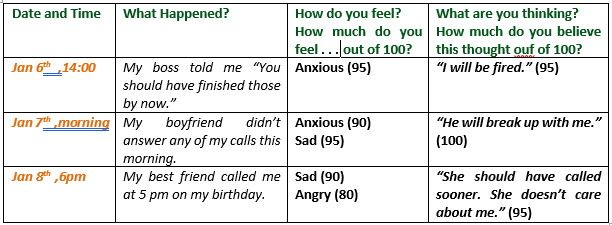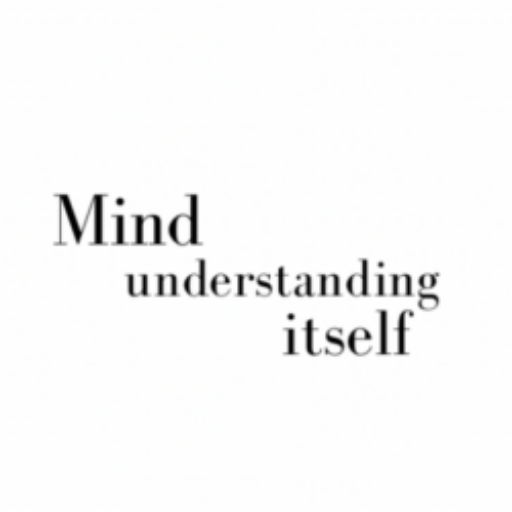Automatic Thoughts: What are They and How can We Identify Them?
In this post, I will try to tell you about what automatic thoughts are and how to identify them.
Sometimes, all of a sudden, we find ourselves feeling depressed, anxious, furious, guilty… However, we can’t tell why. If someone asks, we can’t answer. Our mind is blank:
“I don’t know, I just don’t feel well today.”
or
“I’m afraid, but I don’t know what I’m afraid of.”
Ever experienced?
At times like these, the reason behind our unpleasant feelings might be a stressful thought, which we will refer to as an automatic thought. Especially, when we are feeling really powerful feelings, such as anxiety, it can be very difficult to identify that particular thought behind that feeling. This also happens if the thought is very familiar to the person. As the thought is more familiar, more accepted, like a part of the personality, it is more automatic, and the more automatic the thought is, the more difficult it is to detect it.
There are a few techniques, we use in cognitive therapy in order to help clients to identify their automatic thoughts. In this post, I will try to tell you how you can use some of these techniques to identify your own automatic thoughts, but first, let’s start with understanding what an automatic thought is.
What is an Automatic Thought?
We can have many thoughts at a moment. However, automatic thoughts are the ones that are most related to our powerful feelings. They are also called hot thoughts. They sound more like comments.
A few examples are:
“I won’t be able to pass the exam.” Here, the feeling is anxiety, and the automatic thought is a comment that is predicting what will happen in the future.
“I shouldn’t have eaten that cookie.” Here, the feeling is guilt, and the automatic thought is a comment about what was done in the past.
“He should be more loving.” Here, the feeling is anger, and automatic thought is a comment about someone else’s behavior.
“I can’t do anything!” Here, the person is feeling depressed, and commenting on his own abilities.
Not Every Thought Needs to be Challenged
As you can see in the examples above, hot thoughts create powerful feelings. If a thought is not linked to a powerful feeling, or if it doesn’t affect our functioning, we don’t need to work on that thought. Here is an example to show how to make the distinction:
Chris, being a dad to 3, finds himself thinking “I have to pick up the kids from school at 5 pm. “ while reading some reports at work. He has this thought and then continues working. No powerful feeling, nothing to affect his work. In fact, here, reminding himself that he will be picking up the kids at 5 pm is functional because it is important for him to pick up the kids at the right time.
Jack, being a dad to 3, finds himself thinking “I have to pick up the kids from school at 5 pm. “ while reading some reports at work. He starts to feel anxious. Then, thinks “What if I can’t be there on time?” “What if they’ll have to wait there for me, in the cold. ” “Oh, they will get sick.” “I have to be there on time.” “I’d better leave early.” Jack is feeling anxious, and cannot continue his work. Here, the situation affects Jack’s functioning. He might be at the school on time, but believing the thought is not helping him to achieve his goals related to his work and carreer.
Not Every Thought Causing Powerful Feelings Can be Worked on as an Automatic Thought, BUT…
Not every thought causing powerful feelings can be worked on as an automatic thought , but we can translate many stressful thoughts into automatic thoughts.
Here are a few examples:
“Will I be able to pass the test?” Notice that, here, the person is actually afraid of possibility of not being able to pass the test, and this is why he/she has such a powerful feeling (anxiety). It translates to “I won’t be able to pass the test.”
“What if he gets angry at me?” Again, the person is afraid of the possibility of him getting angry at her. This can be translated to “He’ll get angry at me.”
“Is he going to like me?” Here, the person is actually afraid of the possibility of not being liked by him, and this is why she is feeling anxious. Thus, it translates to “He won’t like me.”
“She doesnt call because she doesn’t like me” Here, the person is sad/depressed because she thinks the reason why she didnt’t call must be that she doesn’t like her. Thus, it translates to “She doesnt like me.”
“How am I going to do all this?” The person is feeling hopeless/depressed. This can be translated to “I can’t do it.”
“How dare he treats me like this!” Here, the person is angry about someone’s behavior. She thinks his behavior is wrong. Thus, this can be translated to “He shouldn’t treat me like this.”
“I can’t believe I ate that cake!” Here, the person is feeling anger and guilt. This can be translated to “I shouldn’t have eaten that cake.”
Identifying automatic thoughts can be confusing, especially at the beginning. Please feel free to write at the comments section if you have any questions. I’ll help you out.
Now, let’s continue with some techniques to identify automatic thoughts.
Techniques to Identify Automatic Thoughts
Here are some techniques to identify automatic thoughts:
1. Go Back to the Time When It All Happened
- Try to identify your unpleasant feeling first, and then try to remember the time when your mood changed. You can think about the last time you felt this way, any time or the time your feelings were most powerful.
Where were you?
What were you doing? Washing the dishes? Did anything interrupt your action, like a phone ring, or a door bell?
What happened?
Just imagine your actions. As you think more about the details, it will get easier to find that particular moment that it all started.
- Let’s assume that you are in that moment:
What are you thinking?
Are there any images in your mind?
If we had a camera that can show everything that is going on inside your head, what would we see? What would we hear?
Are you telling anything to yourself?
- Sometimes, it is not easy to go back and imagine oneself in that situation again. If this is the case, we can try imagining someone else being in the same situation:
Imagine a person is in the same situation as you are/were. He/she has a speech bubble above his/her head.
What is written there?
2. Question the Meaning of the Situation
- If you can remember the event after which you started feeling depressed, anxious, furious…, but you couldn’t identify your stressful thought yet, ask yourself:
What does it mean that it happened? …and that means …and that means? ,repeatedly.
Here is an example:
His boyfriend doesn’t answer Kelly‘s calls. She is thinking:
“He doesn’t answer my calls”.
“What does it mean that he doesn’t answer your calls Kelly?”
“I think he is going to leave me. “
“What happens if he does? What does it mean that he leaves you?”
“It means that he doesn’t love me.”
Kelly can stop here, and work on this thought: “He doesn’t love me.”And, then she can also continue:
“What happens if he doesn’t love you? What does it mean that he doesn’t love you?”
“I’ll be alone. Noone loves me.” Kelly can work on her thought: “Noone loves me.”
Here is another example:
Emily has an important exam coming in two days. She can’t sleep the night. One thought she stuck with is :
“I have to pass this exam.” Emily can ask herself:
“What happens if i don’t?”
“I fail.”
“What happens if I fail?”
“I can’t graduate.”
“What happens if i don’t graduate?”
“I can’t find a job.”
“What happens then?”
“If i don’t have a job my parents will think I went to college for nothing, so they will be disappointed in me.”
Emily can stop here, and work on this thought: “My parents will be disappointed in me if I can’t find a job.” and she can also continue:
“What happens if they will be disappointed in you?”
“Then, they don’t love me?”
“What happens then?/what does that mean?”
“It means that no one loves me. “
Now, Emily can question her beliefs about being loved.
3. Use the Feeling in Order to Reach the Thought
- If your feeling is sadness, ask yourself:
What does this all tell about me?
- If your feeling is anxiety/fear, ask yourself:
What is the worst possible outcome that can happen (in this situation)?
- If your feeling is anger, ask yourself:
What does it tell about other people? What did they do that they shouldn’t have?
- If your feeling is guilt, ask yourself:
What does it tell about me? What is it that I shouldn’t have done?
4. Record Stressful Feelings and Automatic Thoughts
You can record your automatic thoughts on a paper whenever you have an unpleasant feeling. You can do this for a day, or a week, or maybe more in order to see your specific stressful thoughts. You might as well see a pattern.
Here is how to do it:
Try to record what happened, how you are feeling, what are you thinking, and the date.
Here is an example:

This is all for today.
I think identifying automatic thoughts is one of the trickiest parts of cognitive behavioral therapy, but it does get easier with practice.
If you’re having trouble with finding yours, write it to me! I’ll be happy to help.
I would love to hear about your thoughts and ideas about this one! Can you identify your automatic thoughts? How is your experience? Anything you find challenging? Please share them with me below, or send me a message.
If could identify your automatic thought, and now interested in working on it, see the post “How to Challenge Automatic Thoughts” here: https://www.mindunderstandingitself.com/2018/07/01/challenge-automatic-thoughts/
Thank you very much for reading.







A client who is worried/has the thought that she will never find a boyfriend, and may be one of those people who just never find someone (because some people just never do). This thought comes up when a date goes badly, or when a guy she is talking to online suddenly stops talking to her, etc. It causes her to feel sad and lonely, having a close relationship with someone is something she really wants. Thoughts? Advice on this?
Hi Nicole.
Let’s see.
I would first try to challenge this automatic thought “I will never find a boyfriend”. a short example for this can be:
“What makes me so sure? What is my evidence for and against this?”
“What is the worst case scenario? What happens if I never find a boyfriend? (this will take us to the maladaptive assumptions, and core beliefs)
“I will be all alone, and end up like Aunt Beth”
“what does it mean ending up like Aunt Beth? What is wrong with being like Aunt Beth?”
“she has noone to talk to. nobody likes her. she’s a weirdo.” (maladaptive assumptions: if I don’t have a boyfriend, it means that I am a weirdo, so I need to have a boyfriend in order not to be a weirdo? and maybe she has core beliefs relating to not being loved by others because of having flaws)
And also “What does this thought say about my needs desires?” (I need to have a boyfriend? I dont want to be a weirdo?)
“How do I act when I believe and focus on this thought when I am on a date?”
“I don’t talk much, I get anxious, I act weird, thinking that this date will go bad too, or he will not call me tomorrow.” (so trying not to end up being a weirdo, I act weird.)
Is it possible that I can act in a different way even though I have these thoughts in my mind?
WHAT CAN I DO DIFFERENTLY? HOW CAN I DO IT?
So, yes, a person might have core beliefs of being unlovable, or being worthless etc. we all do. we all are somewhere on that spectrum. The important thing is that the person realizes she has such core beliefs, and they affect the way she behaves.
for exp, I wouldn’t be surprised if this person is always attracted to emotionally cold people because cold people are less likely to respond to her emotional needs and this way she can continue believing her belief “I will never find a boyfriend” because “the mind’s job is to validate what it thinks. but I am also sure that this person has every right to believe these beliefs. who knows what kind of experiences made her believe these (for exp in her early childhood) so it is completely normal having these beliefs and thoughts. but the thing is we cannot control what comes to our minds while we are on a date. we can only control how we act (during a date, after a date). and the feedback we get from our changed behavior will eventually change our beliefs as well.
hope this helps.
Hi. Great article.
I’ve started doing CBT , I’m wondering if I have conflicting beliefs, lazy, cursed or if I’m just stubborn.
I’m 48, Female ,long term unemployed, single, unmarried ,on social benefits, live in social housing, and have zero savings, capital. I exercise 4 times a week,to keep me sane. I don’t know if I’m truly depressed or just severely stressed, frustrated, because I’m not living the life I envision
From since I’ve left school, I’ve tried to get into construction, I’ve took several, construction, art and design courses, however when it comes to getting the n skills for actual work I seem to be met with some type of resistance which sometimes comes in the form in relation to either my Age, Ethnicity, Gender. Usually if I’m hired , I last for about a few days because, someone has made an inappropriate action towards me .
I’m at a stage where reality has hit I don’t think it’s going to be, as at 48 I’m not getting younger, Been told numerous times, Women usually get hired in that industry because of who they know, Father, Cousin, etc .
Self employed is not an option right now as I lack the skills,tools, Van,
and also because of bad credit, I cannot borrow any money to get started from Bank, Family or Friends.
Main point is I seriously want to be off welfare, but yet I really dislike working in jobs I have zero passion for, I find it all demoralising, depressing, I feel like I’m selling my Soul just for the sake of money, but yet I do need the money because the lack of it is making me depressed.
People generally call me lazy, tell me I’ll always be poor, because I don’t work, will never have nothing in life, I know in my heart this is true, but my passion for creating and making is all i want to do but getting nowhere, what part of the CBt does my thinking stem from, and how do I actually change my thoughts, what do I say to myself, if that makes sense.
Thanks
Sm
Hi Sm,
First of all, thank you for sharing your story.
I hear that
You would like to understand why you are not living the life you envision for yourself.
and
You would like to do something about it however you have had a lot of difficulties.
Our thoughts and beliefs can make things even more difficult when we are in a situation that we don’t want to be in.
When I have an automatic thought that is not helping me -even if it is true-, I ask myself
“Which thought can I believe instead that will take me closer to what I want in life?”
Believing that “I will never be able to make it” would not help me. so I try to replace it with a more helpful thought that is also closer to the truth.
“Yes, I wasn’t able to do this or that in the past, but that is not proof of what will happen in the future (it is the truth). How should I act now, what should I do instead to make it work this time?”
I hear your thoughts and beliefs such as:
I might be lazy, cursed, stubborn, depressed…
I will always be poor.
People get hired because of who they know. It is more difficult for me to get hired.
I will have problems with people because I had in the past.
I can’t work in a job I don’t like.
I would like to stress that some of our thoughts might have some truth in them. For example, people with certain qualities might be preferred in some industries.
But believing such a thought can only make you more reluctant to apply for jobs and hinder the process of getting the job you want.
here is what I suggest:
1. Decide what you want to change (maybe you could find this post of mine useful Self Help: How to Make That Change in Your Life
2. If you are willing to make the change
3. Understand the situation objectively. If it is not possible to make your dream come true at the moment, still keep it in your heart, yet focus on what is possible right now,
4. Focus on what you can control/ change in order to reach your goal (For example, we can’t control what others do or what they think of us; we can only control how we act)
5. If your thoughts or beliefs are not helping you during this process, try to replace them with more useful ones
Finally,
I hear that you want to create and make
I wonder what would you say about finding the steps to get you closer to your dreams, and turning it into a project where you can create and do your magic?
All the best,
Ayșegül